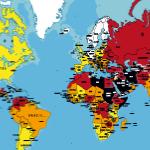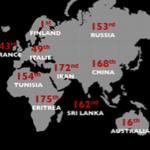In these countries, an independent media either does not exist or journalists are persecuted and censored on a daily basis.
Freedom of information and the safety of journalists are not guaranteed there. Continuing war has made Iraq the most deadly place on earth for journalists in recent years, with 44 killed there since fighting began in March last year.
But there are plenty of other black spots around the world for press freedom. Cuba (in 166th place) is second only to China as the biggest prison for journalists, with 26 in jail (China has 27). Since spring last year, these 26 independent journalists have languished in prison after being given sentences of between 14 and 27 years.
No privately-owned media exist in Turkmenistan (164th) and Eritrea (163rd), whose people can only read, see or listen to government-controlled media dominated by official propaganda.
The greatest press freedom is found in northern Europe (Denmark, Finland, Ireland, Iceland, the Netherlands and Norway), which is a haven of peace for journalists. Of the top 20 countries, only three (New Zealand 9th, Trinidad and Tobago 11th and Canada 18th) are outside Europe.
Other small and often impoverished democracies appear high on the list, such as El Salvador (28th) and Costa Rica (35th) in Central America, along with Cape Verde (38th) and Namibia (42nd) in Africa and Timor-Leste (57th) in Asia.
Reporters Without Borders compiled the index by asking its partner organisations (14 freedom of expression organizations in five continents), its 130 correspondents around the world, as well as journalists, researchers, jurists and human rights activists, to answer 52 questions to indicate the state of press freedom in 167 countries (others were not included for lack of information).
All EU members among the first 40
Italy and Spain are the two European Union (EU) member states that ranked worst, sharing 39th position. In Italy, Silvio Berlusconi's conflict of interests as prime minister and at the same time owner of a media empire continued to affect the independence of the broadcasting sector.
But the relatively poor ranking is due this year above all to the many judicial decisions violating press freedom, including prison sentences for press offences, searches and violation of the confidentiality of journalists' sources.
Spain's poor ranking is due to the resumption of ETA's terror campaign against journalists who do not share its views on international politics or the situation in the Basque country.
It is also due to the manipulation of the news and the direct pressure put on the state news media by the government of Prime Minister José Maria Aznar in the immediate aftermath of the Madrid bombings of 11 March 2004.
The United Kingdom's ranking (28th) is largely due to the situation in Northern Ireland, where journalists are constantly threatened by paramilitary groups. The investigation into the 2001 murder of Sunday World journalist Martin O'Hagan has come to a complete standstill.
In France b(19th), the year was marked by the attempted murder of a journalist with the daily Le Figaro, whose car was riddled with bullets in Corsica in early September 2003.
Belgium's fall to 22nd position is due to a serious violation of the confidentiality of a foreign correspondent's sources. Greece's position (33rd) is attributable above all to the many obstacles to the work of journalists in the run up to the Olympic Games.
The EU's ten new member countries show respect for press freedom but legislation is not always in line with European standards, which recommend the elimination of prison sentences for press crimes. For example, Poland (32nd) sentenced a journalist to three months in prison for defamation. Only a national and international outcry prevented the journalist from going to prison.
The poor rankings assigned to EU candidates Romania (70th) and (to a lesser extent) Bulgaria (36th), as well as Moldova (78th), contrasts with the overall improvement in the Balkans.
Serbia-Montenegro (77th) trails somewhat because of the murder of a journalist who was investigation corruption allegation implicating Montenegro's prime minister.
The remarkable progress made by Turkey (113th) with its legislation with a view to joining the EU has still not translated into a significant improvement in press freedom in practice.
The proof of this was the lack of any fall this year in the number of violations of the kind that are used to calculate this worldwide ranking.
Russia, Caucasus and Central Asia lag behind
In the Caucasus, Azerbaijan's sharp fall to 136th position is the result of a decline in press freedom since the October 2003 presidential election. Around 100 journalists were physically attacked and detained during the rioting that followed the polls.
One of them, who is also the leader of an opposition party, was sentenced to five years in prison. Georgia's fall to 94th position is largely due to unrest in the autonomous republics of Adzhara and Abkhazia, which gave rise to press freedom violations.
In Russia (140th), the biased coverage of the tragic hostage crisis in Beslan, in North Ossetia, was a flagrant illustration of the total control exercised by the Kremlin over the national TV stations.
Many Russian and foreign journalists were prevented from working and the censorship applied to Chechnya was extended to neighboring republics. The Agence France-Presse correspondent in the region is still missing, while two journalists were killed in Moscow during the summer, one of them the editor of the Russian version of the US magazine Forbes.
In Ukraine (138th), pro-opposition journalists and some foreign media were censored in the run-up to the October 2004 presidential election. The number of physical attacks was also very high and those responsible for the murders of journalists, including that of Georgy Gongadze, still enjoy total impunity.
In Belarus (144th), President Alexander Lukashenko's regime tolerates no criticism and all methods are systematically used to reduce the few dissident voices to silence. The information minister closed or suspended some 10 independent newspapers on spurious bureaucratic grounds in the run-up to the legislative elections and referendum on 17 October.
The investigation into the disappearance of opposition journalist Dmitri Zavadski in 2000 was closed although there is little doubt that the highest authorities were involved.
Finally, in Uzbekistan (142nd), the sentencing of a journalist and human rights activist to a heavy prison sentence for "homosexuality" is an example of the government's brutal repression of an independent press that is almost non-existent. The rankings assigned to Kyrgyzstan (107th) and Tajikistan (95th) were relatively good compared to the other countries in the region, but are not grounds for overlooking how extremely precarious press freedom is there. (YE)







